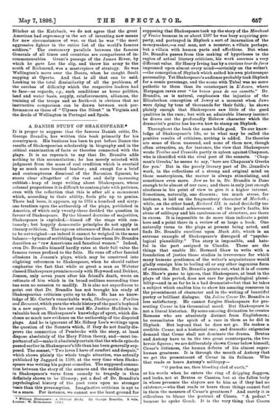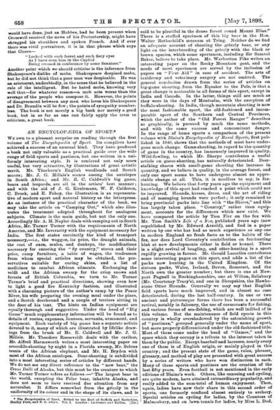A DANISH STUDY OF SHAKESPEARE.*
IT is proper to suppose that the famous Danish critic, Dr. George Brands, has written this book primarily for his countrymen. His business has been to put before Danes the results of Shakespearian scholarship in biography and in the critical examination of facts or theories connected with the plays. It is no reproach to say that Dr. Brandes adds nothing to this accumulation ; he has merely selected with judgment from the mass of real erudition which is overlaid by so much mere learned lumber ; and except for a brief and contemptuous dismissal of the Baconian figment, he steers clear altogether of the vast and daily increasing rubbish - heap of inept writing about Shakespeare, whose colossal proportions it is difficult to contemplate with patience, even with the reflection that this is after all a monument which, according to their ability, fools pile up to genies. There had been, it appears, up to 1884 a hundred and sixty- one treatises upon the authorship of the plays, published in America, of which only twenty-three decided the question in favour of Shakespeare. By the blessed doctrine of majorities, Shakespeare is exploded,—hissed off the stage with con- tumely; but happily democratic principles do not apply in literary criticism. The express utterance of Ben Jonson is not to be outweighed—as indeed it cannot be weighed in the same balance—by tons of scribbling from the class whom Dr. Brandes describes as "raw Americans and fanatical women." Indeed, even Dr. Brands himself hardly rates at their full value the famous verses prefixed to the folio. He runs off after fancied allusions in Jonson's plays, which may be construed into slighting references to Shakespeare, when he should rather emphasise the fact that while so great a man as Webster classed Shakespeare promiscuously with Heywood and Dekker, Jonson, only seven years after his friend's death, wrote an estimate of him which in its broad outlines succeeding time has seen no occasion to modify. It is also not superfluous to point out that Dr. Brandes has not brought his study of Shakespearian criticism quite up to date. He has no know- ledge of Mr. Carter's remarkable work, Shakespeare : Puritan and Recusant, which puts the whole history of the poet's boyhood in a new aspect. He has not read Mr. Justice Madden's in- valuable book on Shakespeare's knowledge of sport, which dis- closes so much new evidence on the authorship of the disputed plays. And he is ignorant of Mr. Sidney Lee's writings upon the question of the Sonnets which, if they do not finally dis- prove the connection of Pembroke with the story, at least dispose absolutely of the Mary Fitton theory, and—most im- portant of all—make it absolutely certain that the whole episode passed earlier in Shakespeare's life than has been generally sup- posed. The sonnet, " Two loves I have of comfort and despair," which shows plainly the whole tragic situation, was actually published by Jaggard in 1599, at the very time when Shake- speare was writing his gayest comedies. The supposed connec- tion between the story of the sonnets and the sudden change in Shakespeare's verse from comedy to tragedy is thus definitely shown to be illusory; yet a deal of Dr. Brandee's psychological history of the poet rests upon no stronger basis than this presumption. Imaginative criticism is apt to be a snare. For instance, we cannot see the least ground for WiItiant Shakmpeare a Critie.41 Stuly. By GeJrge Brat:Idea. 2 Yobs. London: W. Heinemann. [2.13.1
•
supposing that Shakespeare took up the story of the Merchant of Venice because in or about 1597 he was busy acquiring pro- perty, and portrayed in Shylock a sort of incarnation of the moneymaker,—a real man, not a monster, a villain perhaps, but a villain with human parts and affections. But when Dr. Brandeis passes from this making of hypotheses to the region of actual literary criticism, his work assumes a very different value. Sir Henry Irving has by a curious tour de force impressed upon almost every mind—certainly on the writer't —the conception of Shylock which suited his own picturesque personality. Yet Shakespeare's audience probably took Shylock for a comic personage, and the scene with Tnbal was no more pathetic to them than its counterpart in L'A rare, where Harpagon raves over " les beaux yeux de ma cassette." Dr. Brandes, as is natural, emphasises the injustice of the Elizabethan conception of Jewry at a moment when Jews were dying by tens of thousands for their faith ; he shows plainly enough that Shakespeare saw little of the good qualities in the race; but with an admirable literary instinct he draws out the profoundly Hebrew character which the dramatist's genius has known how to stamp on Shylock.
Throughout the book the same holds good. To our know- ledge of Shakespeare's life, or to what may be called the positive results of criticism, nothing is added. Its theories are some of them unsound, and none of them new, though often attractive, as, for instance, the view that Shakespeare wrote Troilus and Cressida partly in spleen against Chapman, who is identified with the rival poet of the sonnets. 'Chap- man's Greeks,' he seems to say, here are Chapman's Greeks for you.' But in the purely literary part of Dr. Brandee's work, in the reflections of a strong and original mind on these masterpieces, the matter is always stimulating, and sometimes even more. Jew as he is, Dr. Brandes is Dane enough to be almost of our race ; and there is only just enough aloofness in his point of view to give it a higher interest. Sometimes, naturally, one dissents ; too much stress, for instance, is laid on the fragmentary character of Macbeth ; while, on the other hand, Richard III. is rated decidedly too high as a technical achievement; all the poet's faults, his abuse of soliloquy and his carelessness of structure, are there in excess. It is impossible to do more than indicate a point here and a point there in a review of so large a book. One naturally turns to the plays at present being acted, and finds Dr. Brandes excellent upon Much Ado, which is an extreme example of Shakespeare's disregard of "psycho- logical plausibility." The story is impossible, and hate- ful in the part assigned to Claudio. These are the things that enable Mr. Bernard Shaw to write with a foundation of justice those studies in irreverence for which many humane gentlemen of the writer's acquaintance would gladly consign him to boiling oil or any other ingenious form of execution. But Dr. Brandes points out, what it is of course Mr. Shaw's game to ignore, that Shakespeare, at least in the plays of this period, does not care for psychological plausi- bility—and in so far he is a bad dramatist—but that he takes a subject which enables him to show his amazing resources in the presentment of character and in the writing of beautiful poetry or brilliant dialogue. On Julius Cesar Dr. Brandin is lees satisfactory. He cannot forgive Shakespeare for pre- senting Caesar in his thrasonical mood. But Shakespeare is not a literal historian. By some amazing divination he creates Romans who are absolutely distinct from Englishmen ; he resuscitates the spirit of a race in them as he did in Shylock. But beyond that he does not go. He makes a credible Cwsar, not a historical one ; and dramatic exigencies demand that Cesar shall not dominate the drama. Brutus and Antony have to be the two great counterparts, the two heroic figures ; we are deliberately shown ewes" below himself, Cmsar's littleness, the human defects of his almost super- human greatness. It is through the mouth of Antony that we get the presentment of Cmsar in its fullness. Who that reads or hears Antony's soliloquy- " 0 pardon me, thou bleeding clod of earth," or his words when he enters the ring of dripping daggers, and looks, not at Brutus or Cassius, but at the fallen body in whose presence the slayers are to him as if they had no existence,—who that reads or hears these things cannot feel in them the measure of Cxsar's greatness ? And surely it is ridiculous to blame the portrait of Cicero. "A pedant" because he spoke Greek. It is the very thing that Cicero
would have done, just as Hobbes, had he been present when Cromwell received the news of his Protectorship, might have shrugged his shoulders and spoken French. And if ever there was vivid portraiture, it is in that phrase which says that Cicero-
" Looked with such ferret and such fiery eyes
As I have seen him in the Capitol
Being crossed in conference by some Senators." Another point which we should criticise is the inference from Shakespeare's dislike of mobs. Shakespeare despised mobs, but he did not think that a poor man was despicable. He was an aristocrat, undoubtedly, in the sense that he believed in the rule of the intelligent. Bat he hated mobs, knowing very well that—for whatever reason—a mob acts worse than the average of the people who compose it. However, the points of disagreement between any man who loves his Shakespeare and Dr. Brandes will be few ; the points of sympathy number- less. The book is not merely a big book nor merely a good book, but in so far as one can fairly apply the term to criticism, a great book.







































 Previous page
Previous page